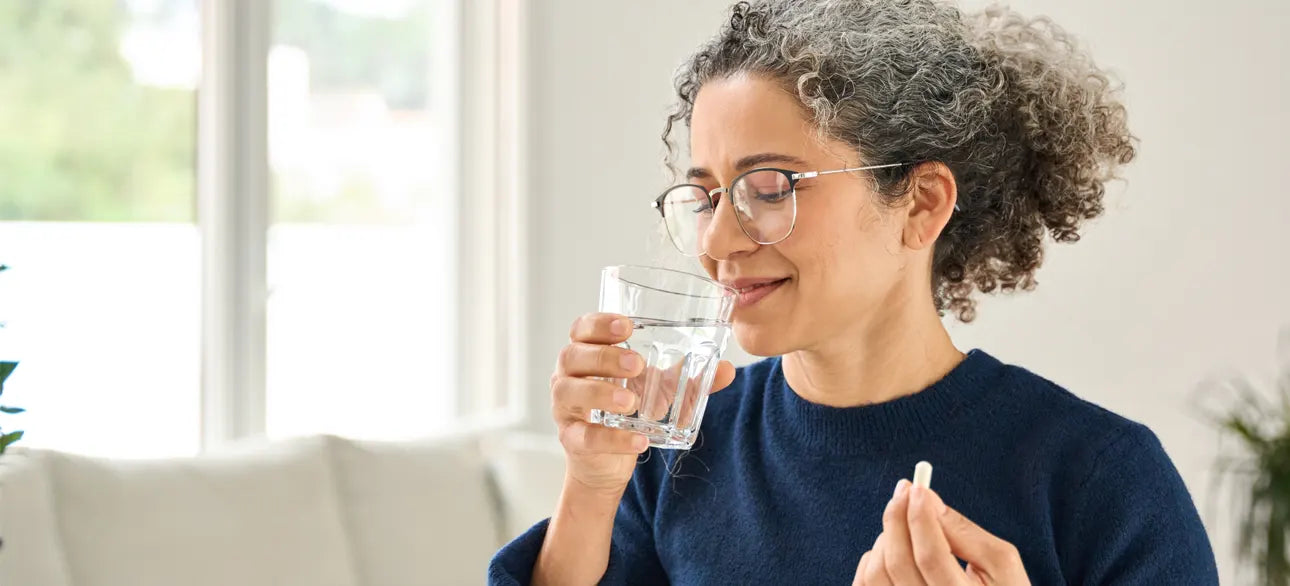What Is Prostate Health and Why Is It Important?
Understanding prostate health is key to aging well. Learn why your prostate matters, common issues to watch for, and how lifestyle changes can support long-term urinary and reproductive wellness.
Advertiser Disclosure: We independently select all the products. If you click through links we provide, we may earn a commission.

Can you name one gland a man has that a woman doesn't?
The prostate gland is one
.Where is the prostate gland?' you ask. It’s right at the base of your bladder, deep within the pelvis.
A proper CT scan will place it wrapped around the urethra (the tube that passes out urine), just underneath the bladder. Small as it may be, it's not to be underestimated.
What does a prostate do? The short answer: it supports reproduction.
The prostate’s function is producing sperm fluid. This fluid protects and supports sperm, helping them swim easily. It does a great deal for male fertility and sexual function
.Men ought to pay more attention to their prostate. What would explain why they knew more about its functions?
Even more importantly, they knew how it connects to sexual health. For instance, the prostate squeezes to push sperm through the urethra during ejaculation. This, among other things, is why it affects male sexual performance. When the gland isn’t working properly, the man may experience discomfort, weak flow, or reduced semen output.
In American male cancer patients, prostate cancer is the second-leading cause of death. About one in 44 will die from it. That’s not a small risk. Understanding all about the prostate gives you the chance to take action early.
Why Prostate Health is Important
A healthy prostate makes for a healthy body in more ways than one. Once there's any form of swelling, inflammation, or weakness, other basic bodily functions will be affected. With a normal, healthy prostate, a man will have normal urinary flow, strong reproductive function, and comfortable sexual activity. It also contributes to overall sexual support, helping maintain confidence and performance. This is why early care for the prostate prevents serious complications down the line.
A healthy prostate makes for a healthy body in more ways than one. Once there's any form of swelling, inflammation, or weakness, other basic bodily functions will be affected. With a normal, healthy prostate, a man will have normal urinary flow, strong reproductive function, and comfortable sexual activity. This is why early care for the prostate prevents serious complications down the line.
One of the telltale signs of a faulty prostate gland is urinary issues. For example, starting or stopping urine, weak urine stream, and frequent urges to use the restroom. Because the gland surrounds the urethra, any slight swelling disrupts the urinary tract. Ignoring any slight change in the prostate can mean a lot of discomfort and frustration ahead.
The prostate gland is also responsible for determining sexual health. This gland does not only produce the fluid that helps sperm survive, it also plays a part in ejaculation. With a defective prostate comes pain, lower semen volume, and problems reaching climax. Some men have also found a link between prostate issues and erectile function. While not the only cause, a poorly functioning prostate can affect essential blood flow and nerve signals during sex.
The quality of semen is an indicator of the state of a man’s reproductive health. Since the prostate helps create that fluid, any problems with the gland can lower fertility. That’s why it's essential to keep it healthy, not just for comfort, but for future family planning.
How to Maintain Prostate Health
It won't be smart to wait until you have health issues before taking care of your prostate. A few good habits, like eating well, light exercise and regular visits to the doctor, can keep the gland in great shape. These steps not only support overall wellness but also improve urinary flow and prostate health—making a real difference in how you feel as you age.
Let's explore how:
It all starts with your diet
“You are what you eat”, people say. You can protect your prostate from inflammation with foods rich in antioxidants. Natural remedies for enlarged prostate often start with diet, so have more fresh vegetables, fruits, tomatoes, berries, green vegetables, and fish like salmon. Try to eat less processed meat, fried foods, and sugar. What’s on your plate every day affects your prostate's state.
According to Mark Hyman, MD
What you eat has a direct impact on inflammation and hormone balance—two key factors in prostate health. A colorful, antioxidant-rich diet isn’t just good advice, it’s powerful preventative medicine
Movement matters too
Just a little bit of activity each day helps. A brisk walk, light stretching, or bike ride a few times a week does a lot for weight control, blood flow, and hormone balance. Staying active supports your whole body, including your prostate.
Don’t skip regular check-ups
If you’re over 50 or you have a family history of prostate issues, talk to your doctor about screenings. Early testing helps catch small problems before they turn into something serious. Prostate exams aren’t something to fear; they’re something to respect.
Common Prostate Health Conditions
A few prostate-related health issues come up as men age. These issues usually come with identifying symptoms. Being informed is key to discovering any prostate changes for quick medical attention. Here are some common prostate-related illnesses.
 Common Prostate Health Conditions
Common Prostate Health Conditions
Benign Prostatic Hyperplasia (BPH)
Changes in hormones that often occur in men over 50 cause BPH. Men with BPH have swollen prostates that squeeze their urethra and bladder, hurting the urinary process. Has nothing to do with cancer. Signs of BPH are: frequent urination (especially at night), difficulty starting urination, and constantly feeling pressed. It's not fatal, but it could make living difficult.
Prostatitis
This one happens when the prostate is inflamed by bacteria. Sometimes it happens without a clear reason. Men with prostatitis have discomfort during urination, pain in the lower abdomen and pressure in the pelvic area. Some said they also had flu-like symptoms. It may happen suddenly or over time, so getting medical attention is important once you see signs. That way, you can avoid complications.
Prostate cancer
Prostate cancer is the result of abnormal cell growth. It's unlike other common prostate health issues. First, it shows no symptoms at its earliest stage. Second, it may prove fatal if ignored. Also, it may be brought on by aging, wrong lifestyle choices or a genetic disorder. It is easily treated if discovered quickly.
Symptoms to Watch Out For
You usually get warning signs if you've got problems with your prostate. Pay attention to any change in how you pee or experience sexual activity. This, for instance, might just save your life.
There are more signs to get your prostate checked. One is a weak or hesitant urine stream. A second concern is visiting the bathroom more often, especially at night. Another sign to go get your prostate checked that feeling of having a full bladder even after using the bathroom.
There's no shortage of signs that something could be wrong with your prostate. Even if they fluctuate, they must be checked to determine if there's any infection, inflammation or abnormal growth. It goes without saying to go get checked if you have pain during urination or the presence of blood in your urine or semen.
Sexual symptoms like discomfort during ejaculation or trouble keeping an erection may also be related. Look out for these changes, because they are sometimes the first indication that the prostate isn’t functioning as it should. Don't delay making that doctor's appointment if you experience any of these problems, especially if they persist.
Treatment and Management of Prostate Health Issues
Prostate conditions can be managed effectively when caught early and treated with the right approach. Treatment depends on the type of issue, its severity, and the person's overall health.
For Benign Prostatic Hyperplasia (BPH), medication is often the first step for benign prostatic hyperplasia (BPH). Alpha blockers help relax the muscles around the bladder and prostate, making it easier to urinate. Another type of medicine, 5-alpha reductase inhibitors, works to shrink the prostate over time. In more serious cases, surgery may be needed to remove part of the gland or widen the passage for urine. Lifestyle changes like reducing caffeine and staying active can also ease symptoms. Adding the best prostate health supplements may also help manage symptoms naturally and support overall gland function.
The treatment of prostatitis usually depends on the cause. If it’s due to a bacterial infection, antibiotics are prescribed. In other cases, anti-inflammatory medicines or warm baths may help relieve pain and pressure. Drinking plenty of water and following a healthy prostate Diet can support recovery and reduce flare-ups.
Prostate cancer treatment varies based on how early it is found and how aggressive it seems. Surgery to remove the prostate is one option. Radiation therapy may also be used to target cancer cells. Some cases may be managed with active monitoring, especially if the cancer is slow-growing. Lifestyle changes such as eating a balanced diet and staying physically active can support recovery and improve long-term health.
Conclusion
The prostate shouldn't be underestimated. It's got control of essentials like urinary control, aiding reproduction and sexual function. In order to stay healthy while growing older, a man has to pay attention to it. He has to understand how it works, what can go wrong and how to get help.
Issues with the prostate sometimes ring no warning bells. Waiting for symptoms to show before eating well, staying active, and going for regular checks would be a mistake. Staying proactive and having the right habits help a lot.
More importantly, see your doctor if you are over 50 or have a family history of prostate issues. With regular checks and tests, any slight change in your prostate can be treated before it gets serious. With timely care, you can have great prostate health.































1 comment
I’ve been learning a lot about prostate health recently, and this article really opened my eyes. The connection between prostate function and sexual health is something I didn’t fully understand before. I appreciate the easy-to-follow tips on maintaining prostate health, especially the dietary recommendations. Definitely going to make some lifestyle changes!